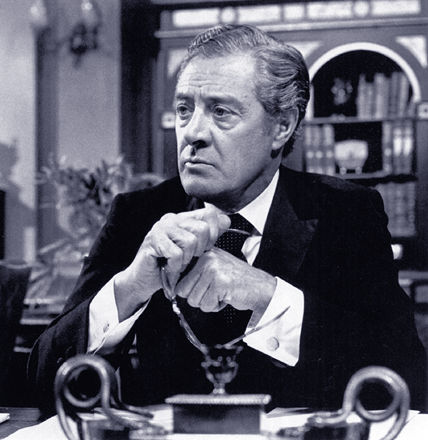David Langton (David Muir Langton)

David Langton was born Basil Muir Langton-Dodds to a middle class family in Motherwell, Lanarkshire in 1912. His father was a wine merchant and Langton’s family moved to England when he was four years old. He attended a prep school in Bath, Somerset and left education at the age of 16. Langton’s father had always encouraged him to go into acting and got him his first job touring with a small Shakespearean company. At 19 years old, Langton left the theatre and went to live on Yell, a remote island in the Shetlands, and became a sheep farmer while attempting to become a writer. However, he later admitted this was a “disaster”, and when he went back to the mainland when his mother was ill, he realised he did not want to return. In 1938, Langton returned to working full-time in theatre. It was at this time that he changed his name to David Langton, as there was already an actor called Basil Langton, and his legal name was David Muir Langton. However, in 1939 the war broke out and Langton soon enlisted. He first served in the Royal Artillery ending up a sergeant and was later commissioned in the Northumberland Hussars and ended up a major. Langton served in France, Germany and Belgium. He married his first wife, Rosemary, in 1940. When the war ended, they realised that the marriage had been a mistake, but stayed together for the sake of their three sons, Simon, Andrew and Robin. The eldest, Simon, a director, would later work with his father on the set of Upstairs, Downstairs. Langton divorced in 1966.
Within four days of leaving the Army following the end of the war, Langton was cast in a play called Fifty Fifty and in 1950, following some periods of unemployment, he got a part in Seagulls Over Sorrento. Following the death of his father, Langton went missing and was discovered in New York, where he was en route to see his brother Donald in Canada. He later explained that he needed a break, and soon returned to Seagulls Over Sorrento, which finished its run in 1953. Following Seagulls Over Sorrento, he acted in many plays, including Agatha Christie’s Rule of Three and The Devil’s Disciple, where he met and formed a friendship with Tyrone Power. David Langton had started his television career in the 1950s and went on in the 1960s to appear in The Troubleshooters, Out of the Unknown, The Avengers, The Champions, Dr. Finlay’s Casebook and Special Branch. He also appeared in A Hard Day’s Night and The Liquidator. In 1968 director Douglas Camfield chose Langton to portray Colonel Lethbridge-Stewart in the Doctor Who serial “The Web of Fear”, but Langton dropped out to perform in a TV play before production began, so Camfield gave the part to Nicholas Courtney, who had originally been cast in different role. As played by Courtney, the character of Lethbridge-Stewart (better known as the Brigadier) returned to Doctor Who the next year and became one of its most recognisable supporting characters, appearing in Doctor Who irregularly until 1989 and making a final appearance in spin-off The Sarah Jane Adventures in 2008. Langton achieved international fame in 1971 playing family patriarch Richard Bellamy in the popular historical serial drama Upstairs, Downstairs. He was given the role after a chance encounter with producer John Whitney at the Garrick Club in London. During some of Upstairs, Downstairs’s run, Langton actually lived in Eaton Place, the square in Belgravia where Upstairs, Downstairs was set and where exterior scenes were filmed.
Following the success of Upstairs, Downstairs, Langton appeared in the 1972 BBC Television adaption of Dorothy L. Sayers’s Lord Peter Wimsey mystery Clouds of Witness, as the Duke of Denver, older brother to Lord Peter Wimsey, the 1976 film The Incredible Sarah, and Robert Altman’s 1979 sci-fi film Quintet starring Paul Newman. In the 1980s, he appeared on television in The Spoils of War, and played Sir Charles Baskerville in the 1983 TV film of The Hound of the Baskervilles, Earl Mountbatten of Burma in Charles & Diana: A Royal Love Story, and H.H. Asquith in Number 10. His final television appearances were in The Case-Book of Sherlock Holmes (The Illustrious Client) and Absolutely in 1991, and The Good Guys in 1992. Langton had also continued to appear on stage, including appearances in Night and Day, Ross and Beyond Reasonable Doubt. In May 1975, Langton married his second wife, Claire Green, the former wife of TV host Hughie Green. In 1994, he suffered a fatal heart attack and died in Stratford-upon-Avon.[5] The subsequent obituaries revealed that he was in fact 82, not 72 as was his “official age”. The obituaries also paid tribute to a “popular and easy going man” who always “behaved like a gentleman”.
Born
- April, 16, 1912
- Scotland
- Motherwell, Lanarkshire
Died
- April, 25, 1994
- United Kingdom
- Stratford-upon-Avon, Warwickshire, England
Cause of Death
- heart attack
Other
- Cremated

